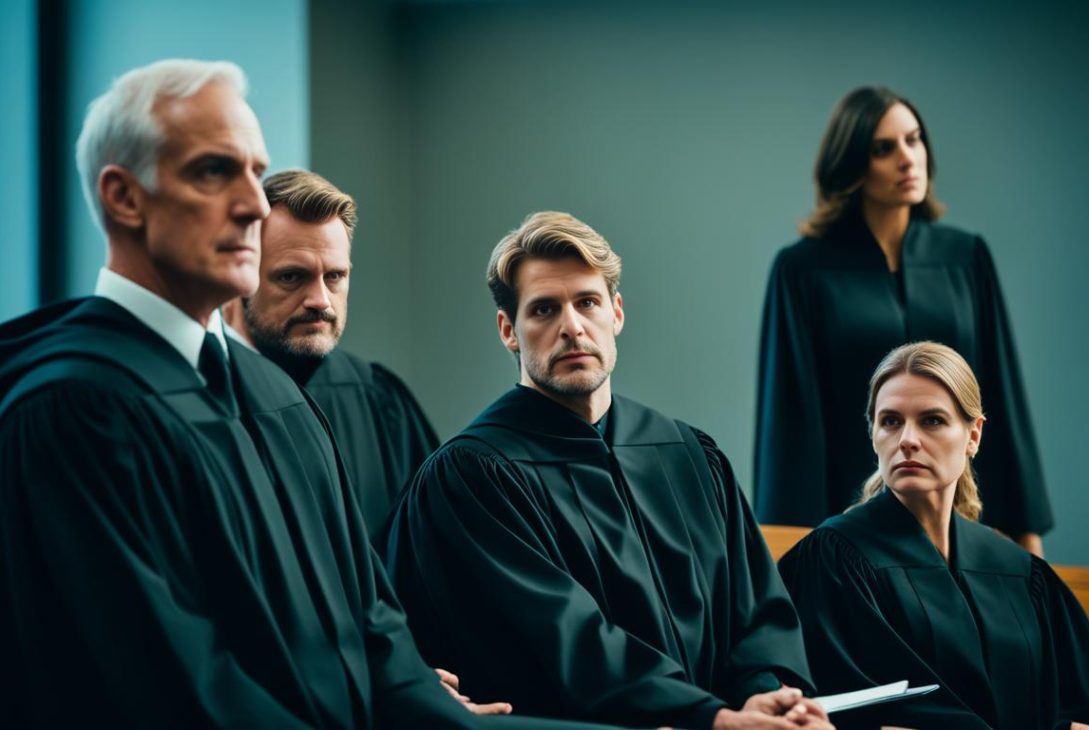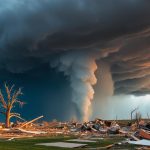The US Supreme Court justices seem to back a type of immunity for former President Donald Trump. This decision could not just affect Trump’s case, but also the power of future presidents. With a strong 6-3 Republican majority, their ruling might change how government officials are held to account later on.
Key Takeaways
- The current Supreme Court’s composition heavily leans Republican with a 6-3 majority.
- A trend of granting immunity to high-ranking officials may continue, based on historical precedents.
- The Supreme Court’s stance on Trump’s claim of immunity has the potential to delay his trial.
- With existing concerns over the implications for future presidencies, the case garners critical significance.
- Trump’s pursuit of a novel form of immunity could redefine the bounds of criminal law in relation to the presidency.
- Decisions made now might signal future adherence to or deviation from established precedents.
Historical Precedents of Presidential Immunity
People are watching the legal issues surrounding Trump’s immunity claim. We look into history, like Nixon v. Fitzgerald, for insights. This case showed that presidents have some immunity. It helps judges decide on similar cases today.
Understanding Nixon v. Fitzgerald
The Nixon v. Fitzgerald case is key when talking about presidential immunity. It made clear that presidents can’t be sued for things they do while in office. This ruling outlined the limits of presidential power.
The Concept of ‘Outer Perimeter’ of Presidential Authority
The ‘outer perimeter’ means some actions a president takes are protected from lawsuits. This idea helps presidents do their job without worrying about court cases. But, people argue about how far this protection goes. They wonder if it keeps presidents from being held responsible in court.
Implications for Trump’s Claim of Immunity
Trump’s immunity claim brings Nixon v. Fitzgerald back into the spotlight. His team says his actions are within the protected ‘outer perimeter.’ They argue his choices, even the controversial ones, are covered. This raises questions about the limits of presidential immunity.
“The courts have long recognized the profound importance of presidential immunity in safeguarding the function and dignity of the office.”
This issue goes beyond one president. It’s about keeping the presidency’s role solid. So, we must carefully consider history’s lessons and how they apply now
Debate Over Official Acts vs. Private Gain
The question of presidential immunity is causing big arguments in court. They are trying to figure out if immunity should just protect official acts or also cover personal profit activities. This is important because it’s about keeping the office’s honor but stopping power misuse.
The Conservative Justices’ Stance on Immunity
Conservative justices think immunity should cover more, including official acts. They believe a president needs this to do their job well, without worrying about being sued all the time. They’re involved in a key legal battle1, which Trump is part of. This battle raises a big question: How much should laws protect a president’s actions?
Liberal Justices’ Concerns Over Impunity
Liberal justices, however, worry that too much immunity could let a president get away with anything for personal gain. They fear this could make a president too powerful, with no one to check their actions. Their concerns are part of big debates at the Supreme Court2. They’re cautious about decisions that might let officials ignore laws and ethics.
There’s a big fight over legal philosophy. It’s between conservative justices who want to shield presidential rights and liberal justices who are on the lookout for abuse. This debate is shaping American law in a big way.
| Viewpoint | Stance on Official Acts Immunity | Concerns Over Private Gain | Recent Case References |
|---|---|---|---|
| Conservative Justices | Broad interpretation, essential for effective governance | Less emphasized | Trump’s appeal in DC Circuit1 |
| Liberal Justices | Restrictive, to ensure accountability | High risk of impunity and abuse of power | Supreme Court’s contentious caseload2 |
US Supreme Court justices in Trump case lean toward some level of immunity
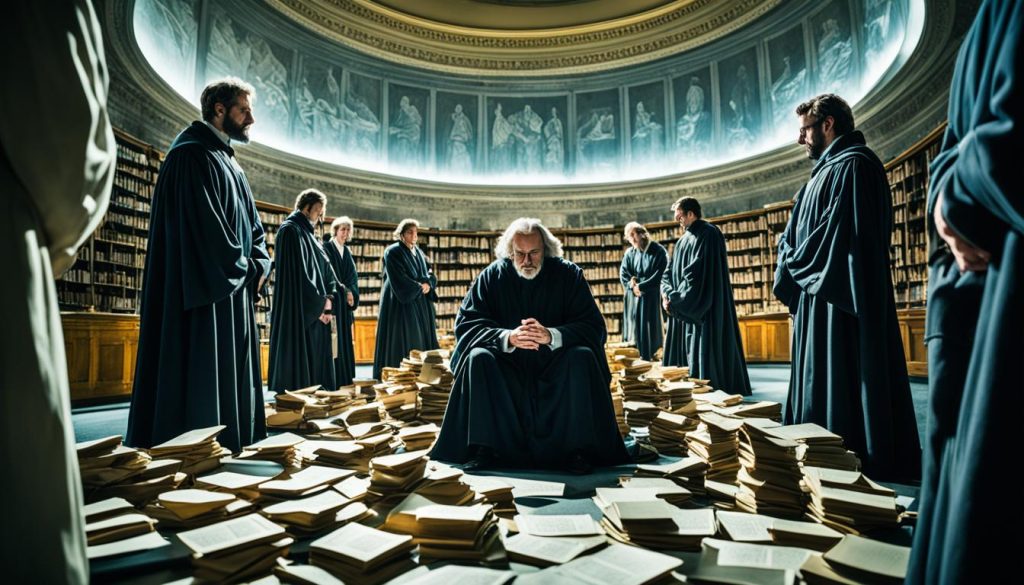
The US Supreme Court has changed after Donald Trump added three conservative judges. These judges are leading a conservative push in big cases, including Trump’s. At least five justices seem doubtful about Trump’s claim to total immunity. This shows a change in how they view the power of a president34.
Justices like Neil Gorsuch and Brett Kavanaugh think a former president might get some immunity. This shows the court’s careful way of making decisions4. This could make the trial longer if it goes back to lower courts4. Justice Amy Coney Barrett, chosen by Trump, is less open to his claims. This adds to the unpredictability of the court’s decision4.
The decision on Trump’s case will affect future presidential immunity rules4. The court usually gives its final opinion by the end of June. This timing matters a lot for the election process4. They might deny Trump’s immunity claims or protect former presidents from being charged4.
- The Supreme Court’s leanings hint at establishing clear boundaries for presidential immunities
- Lower courts may witness a remanded Trump case for additional hearings
- The timing of the court’s final decisions crucially impacts election preparedness
- A precedent-setting decision looms, with implications for future presidencies
The Supreme Court often sets rules for how presidents should act. It has said no to Trump’s total immunity claim in the past. Since Trump appointed over 230 federal judges, the judiciary’s direction on main issues like gun laws, abortion, and affirmative action might change43.
The upcoming decision on Trump’s immunity will be key in figuring out if former presidents can face legal action, especially for election-related charges43. The case, led by Jack Smith, accuses Trump of trying to interfere in the election, putting extra pressure on the court as they consider the balance of powers4.
As we wait, the courts aim to stay fair and just, keeping democracy alive. The Supreme Court’s ruling will show how we balance the law and a president’s unique role.
The Role of Supreme Court Rulings in Shaping Constitutional Law
The Supreme Court, as our top court, makes key decisions on the Constitution. These decisions often create long-lasting rules. The impact of Supreme Court rulings is huge, like in a case about a former president’s right to run for office5. The justices, from various viewpoints, questioned parts of this case. Their role is crucial in shaping our nation’s laws5.
Looking at past cases, like Bush v. Gore, shows the Court’s big role in presidential elections5. Its next decision will set a nationwide standard by deciding if a candidate can be on Colorado’s ballot5. This decision will affect more than Colorado, as similar issues have come up in other states like Maine5.
Debating amendments: The 14th Amendment’s Section 3 is key in this debate. It deals with banning insurrectionists from holding office5. The Supreme Court’s view could change how much power states have versus the federal government. Chief Justice Roberts and Justice Kavanaugh highlighted the debate on state versus federal power, hinting at a unified way to manage candidate qualifications5. This focuses on the rule about engaging in insurrection, possibly changing state and federal power dynamics5.
The case against the Colorado Supreme Court’s ruling is vital. If the argument favoring the former president wins, it could affect future candidates5. This issue underscores the ongoing power struggle between states and Congress, showing the Court’s significant role in our constitutional law5.
In sum, as we face these critical questions, the Supreme Court’s decisions remain key. They clarify Congress’s power and state limits, shaping our legal landscape. Every ruling adds to our legal history, highlighting the Supreme Court’s lasting impact on America’s legal structure.
Chief Justice Roberts’ Views on Judicial Decision-Making
Chief Justice John Roberts is at the heart of debates on the judiciary’s role today. His views on judicial decision-making are key as high-profile cases make headlines. One such case is Donald Trump’s trial, where the Supreme Court’s interpretation of the 14th Amendment is crucial. This interpretation affects the legal and political worlds, especially regarding election laws and disputes.
Roberts’ Mention of Absolute Immunity
Chief Justice Roberts recently discussed absolute immunity, a hot topic in presidential accountability. This discussion happens as the Constitution’s protections for presidential candidates face tough tests. A notable example is attempting to disqualify Trump from a state primary ballot using the 14th Amendment.6 This move, unprecedented against a presidential hopeful, could create a new historical precedent6.
Impact of Court Appeals on Trump’s Trial
Trump is up against 91 criminal charges in four areas6. Roberts’ views may sway court appeals in Trump’s case. While Trump hasn’t faced charges for anti-insurrection, the Supreme Court’s doubt on barring him may signal wider effects. This is important for decision-making in politically charged cases6. The court’s ultimate decision on Trump’s ballot eligibility will majorly influence future legal standards and the 2024 election6.
The Supreme Court’s decision will weigh the judiciary’s authority against electoral powers and appeal processes.
Legal Immunity and Its Potential for Abuse
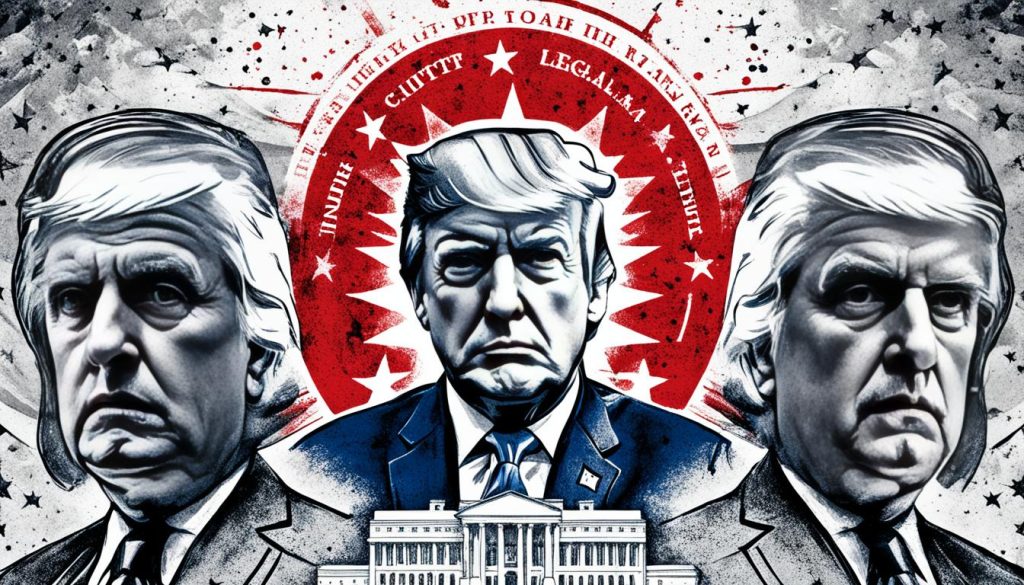
Recent cases, like former President Donald Trump’s, raise questions about legal immunity. They highlight how it may be misused. Legal safeguards work to stop power abuse, balancing the judiciary’s role. But, liberal justices worry about an uncheckable president threatening justice.
Liberal Justices’ Fears of an ‘Uncheckable’ President
Lately, legal experts worry about a president escaping all checks. They think this immunity might let a president act above the law. This worry grows as justices examine if safeguards actually prevent misuse of power.
Exploring the Boundaries of Legal Immunity
A court case made people look closer at presidential power limits. A US appeals court panel doubted if Trump had total immunity from being charged1. Trump’s lawyers admitted even presidents could face charges after leaving office1.
This admission sparked talks about where immunity ends and the risks of too much power. It reminds us that legal immunity’s role is to protect, not to grant someone total freedom from law.
Trump’s lawyers tried delaying his trial to March 4, showing how law and politics mix1. They rushed to get the Supreme Court to decide on immunity fast, pushing for clear rules1. Yet, the court sent the case back, pausing any quick accountability1.
Fears of unchecked power underline talks on legal immunity abuse. Swift court decisions against Trump could still face delays. He could ask for a full court review or go to the Supreme Court within 90 days1. The battle between legal deadlines and strategic delays shows the complex relationship between law and politics.
Trump’s Indictment and the Supreme Court’s Dilemma
The Supreme Court is in a tough spot as it sifts through Trump’s indictment. It must figure out the line between his role and alleged wrongdoings. In these unique times, they face charges full of controversy. Each tests the court’s ability to interpret the law.
Controversial Indictment Charges Discussion
The justice system is under pressure as everyone waits for the Court’s view on Trump’s controversial charges. These charges put the Court’s legal wisdom to the test, challenging its ability to navigate complex legal precedents.
Differentiating Official Conduct from Illegal Acts
At the heart of this issue is the challenge of separating allowed official actions from illegal ones. The decision of the court is crucial. It depends on their interpretation of these actions and presidential immunity.
| Official Acts Under Scrutiny | Alleged Illegal Acts |
|---|---|
| Executive decisions and policy-making | Actions for personal benefit violating law |
| National security measures | Obstruction of justice or other high crimes |
| Functional duties of the presidency | Incitement of insurrection or public unrest |
This legal puzzle is crucial as the Justices ponder over Trump’s indictment. The Supreme Court’s decision is awaited by many, recognizing its impact goes beyond the courtroom. It touches the essence of constitutional integrity.
Justice Department’s Safeguards Against Partisan Prosecutions
The Justice Department is like a shield against using the law for political reasons. It’s important to keep things fair and stop partisan prosecutions. For instance, recent court decisions about classified information and political figures show these ideas at work.
Take Justice Clarence Thomas, who often leans conservative. He was the only one who disagreed when the Supreme Court decided to share sensitive information. This shows how judges can have different views but still need strong safeguards to keep justice unbiased.
The U.S. Court of Appeals for the 11th Circuit unanimously decided against appointing a special master. This decision highlights the courts’ role in maintaining balance and fairness. It shows they can correct themselves to prevent partisan prosecutions.
Maintenance of impartiality in legal proceedings remains a cornerstone in the pursuit of equitable justice.
Legal experts worry about Judge Cannon’s early decisions. Their concern shows how important it is for the legal community to stay alert to keep court decisions fair.
| Judicial Event | Legal Community Response | Implications on Safeguards |
|---|---|---|
| Special master appointment | Reversal by the 11th Circuit | Upholding judicial balance |
| Judge Cannon’s rulings on classified documents | Filed motion for reconsideration | Challenging potential bias7 |
| Lawfare blog’s remedy proposal under CIPA | Procedural option for addressing classified information decisions7 | Strengthened procedural safeguards |
| Judge Cannon’s bias in legal proceedings | Analysis by former prosecutor Joyce Vance | Consideration of timing in hearings7 |
| 11th Circuit Court’s intervention | Rebuke of Judge Cannon | Precedent for future scrutiny7 |
Actions like challenging Judge Cannon’s decision to share classified documents are key. They add more layers of protection against wrongful legal influence. Blogs like Lawfare offer wise ways to handle sensitive details, essential for a fair legal process.
Concerns over judges with ethical issues highlight the need for the Justice Department’s high standards. This ensures our legal system stays strong and fair. After all, justice and democracy go hand in hand, keeping bias at bay is crucial for our country’s honor.
Concerns Over Politically Driven Prosecutions Post-Presidency
American politics now faces the chance of politically driven prosecutions after a president’s time ends. This situation affects individuals and has bigger impacts on the country’s legal and political systems. The confirmation hearing of Hon. Neil M. Gorsuch shows how deeply we look into these matters and the expected behavior after the presidency8.
The process of selecting Supreme Court justices is key in keeping the government’s balance. The in-depth four-day hearing for Hon. Neil M. Gorsuch, from March 20 to March 23, 2017, exemplifies this careful selection. High-profile senators, like Feinstein and Graham, played significant roles in evaluating Gorsuch for a lifelong position8.
Many witnesses, including Michael Bennet and Neal Katyal, and senators from both parties, show how detailed our judicial reviews are. This in-depth process aims for fair and unbiased lawful assessment after a president’s term8. Individuals like Amy Hagstrom Miller and Jameel Jaffer brought diverse views, highlighting the range of issues that can arise8.
The careful check and exposure to different beliefs highlight how we should handle post-presidency prosecutions. It means if we ever need to investigate a former president, the reasons must be non-political and adhere to strict standards8.
As we examine executive power after a presidency, fairness and following the law are crucial. The Gorsuch hearings demonstrate the challenges in achieving fairness, brought up by experienced lawmakers and experts. Their work was crucial in determining the outcome8.
Trump’s Legal Team Strategy and Delaying the Trial
Trump’s legal team has a clear plan: delay the trial as we near the November election. Their strategy relies on arguing presidential immunity to slow down the process. This could significantly change the situation, affecting the principles of justice.
Trump’s Lawyers Winning Delays
Trump’s lawyers are fighting hard for trial delays. They claim the president has certain immunities that protect his actions. These are seen as crucial to his role. This idea has supporters among conservative judges9.
They hope that getting a delay, possibly through sending the case back to Judge Tanya Chutkan, could postpone the trial further9. This would be until after the election, affecting its outcome.
Effect of Delays on Election and Justice
Justice Sotomayor emphasizes the need for honesty in government. She warns of a conflict. On one hand, we want to keep our democratic values. On the other, avoiding criminal charges could prevent challenges to a smooth power transition9.
Justices like Alito and Kavanaugh express worries. They believe the laws in Trump’s case are too broad. Such issues could weaken democratic standards if a new government decides to pursue charges9.
We’re caught in a whirlwind of legal and ethical questions. The balance of justice is uncertain as we debate trial delays, election fairness, and ensuring justice for all. Liberal judges, however, highlight a danger: setting a precedent that might give future presidents a pass for illegal activities, guarded by their position9.
| Justice Stance | Concerns | Impact on Trial Strategy |
|---|---|---|
| Conservative | Statutes too vague, risk of hindering presidential functions | Seek delays; argue for immunity |
| Liberal | Risk of granting impunity creates unchecked power | Advocate for good faith in public office |
Implications of Special Counsel’s Involvement
Having a Special Counsel in legal cases means a lot, especially with big names like a former President involved. This position mixes law and politics, as seen in the case against Donald J. Trump by the US Supreme Court. The Colorado Supreme Court’s decision that Trump is disqualified because of insurrection shows the Special Counsel’s important role10.
The Special Counsel’s job gets more complex with such rulings. For example, Colorado’s Secretary of State followed the court’s order to keep Trump off the 2024 ballot. This decision affects democracy and sets a precedent for future situations10. The inclusion of past speeches and legal documents in case appendices enhances the Special Counsel’s analysis10.
| Case Document | Implication |
|---|---|
| President Trump’s January 6 Speech | Provides context to the charges of insurrection |
| Constitutional Amendments | Outlines the legal backbone for disqualification |
| Colorado Revised Statutes | Strengthens state-level legal arguments |
The Final Report, known as HR 117-663, is key in guiding the Special Counsel’s investigation actions10.
Trump’s claim to immunity is viewed with doubt by judges, including those with different political views. This skepticism might affect how the case unfolds11. The situation dives into politics, noted by refs to key works by media and scholars in the legal briefings10.
- Appeals could happen, adding uncertainty to the case timeline and highlighting the Special Counsel’s strategic role11.
- Calls of absolute immunity are alarming, with Trump being the first ex-President faced with such allegations. The stakes are incredibly high11.
- If litigation drags on past the election, it could change the election’s integrity11.
Last, the Supreme Court’s hearing, with mentions of political effects by Justices Kavanaugh and Roberts, shows the Special Counsel’s wide impact12. It’s not just legal analysis; it’s about democracy, power, elections, and justice. This shows how deep the Special Counsel’s work goes in high-stakes cases12.
The Supreme Court’s Pending Decision and Its Consequences
The whole country is watching the Supreme Court closely. They’re waiting to see if Donald J. Trump can run for president again. A recent decision by the Colorado Supreme Court said Mr. Trump can’t run, suggesting big legal battles ahead13. At least 16 other states could challenge his candidacy, making this a critical time as the Supreme Court thinks over the case13.
This Supreme Court decision could change a lot more than just one case. It might mess up how decisions and trials happen during the busy presidential election period. If the Court’s decision comes too close to the election, it could shake up the legal world like never before13.
The Timing of Decisions and Trials
Our democracy is really being tested. The Supreme Court is planning to talk about this the week of April 22, with a decision coming after that14. The law and public opinion are on edge, waiting to see what will happen. If it goes to trial, it could start in just two to three months, right before important election deadlines14.
Presidential Election and Its Influence on Judicial Proceedings
The influence of judges who aren’t elected on the presidential race is a hot issue13. The Supreme Court has a big role in supporting or questioning the choice of voters. This not only affects one candidate but also could set a rule for how state courts might stop certain federal candidates from being on ballots in the future13.
| Factor | Impact on Supreme Court’s Decision | Impact on Presidential Election Timing |
|---|---|---|
| Trump’s Constitutional Eligibility | Ruling could set a legal precedent13 | May alter primary ballot listings13 |
| State Legal Challenges | Elevates the complexity of judicial review13 | Amplifies political tension in multiple regions13 |
| Judicial Independence | Upheld through life tenure of justices13 | Preserves integrity of the election process13 |
The link between legal battles and political timelines is getting a lot of attention because of the Supreme Court’s decision yet to come. Alongside, the upcoming presidential election acts as a measure of how much these judicial events can affect voters’ faith in the democratic system they rely on1314.
Trial Delays and Their Impact on Democracy
Trial delays weaken democracy, making people doubt the law. Quick justice is key, keeping everyone, even top leaders, accountable. It’s important to see how these delays hurt democracy.
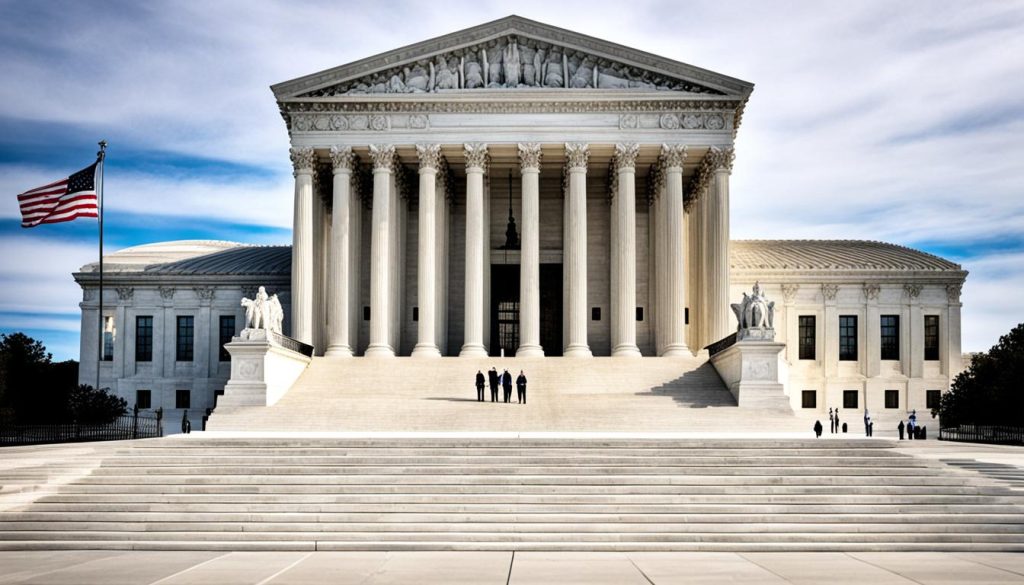
The University of Pennsylvania has many studies about democracy, over 281815. One key article is “Presidential Accountability and the Rule of Law”. It highlights that no one is above the law, an essential idea for democracy15.
Delays in important trials, like those involving a President, harm how people see justice. The case of Trump v. Vance showed that even Presidents aren’t immune. This leads to doubt and distrust15.
No single government branch should have all the power. They should check each other to protect democracy15.
The government’s parts should balance power. But sometimes, one part tries to control the others. This makes trial delays more risky for democracy, as studies show15.
| Democratic Principle | Impact of Adherence | Impact of Trial Delays |
|---|---|---|
| Equal Justice Under Law | Maintains public trust in the judiciary | Erodes trust and promotes a sense of injustice |
| Presidential Accountability | Upholds the integrity of the executive office | Lends to unchecked power and potential abuse |
| Fidelity to the Rule of Law | Ensures political stability and order | Leads to skepticism and potential civil unrest |
| Checks and Balances | Prevents power consolidation | Allows the marginalization of legislative and judicial powers |
The balance between state and federal power is crucial for democracy, as research15 shows. This balance, and the separation of federal powers, maintain political stability.
In conclusion, trial delays damage democracy’s foundations. They threaten justice and equality. The dominance of one branch, without checks, is a big risk15.
Conclusion
The talk about presidential immunity keeps going as the US Supreme Court Justices think over a big case10. This case is important for future candidates and our democracy. We’ve summed up the deep arguments made, from old cases to how this could be misused.
The different views from legal experts and law firms’ roles show how complex the case is10. It’s a clear example of how law and politics mix, and the Colorado Supreme Court’s action shows how serious this is10.
The rules from Colorado, compared to the President’s legal status, raise tough questions10. These questions are about who can run for president and appear on ballots, something courts and voters really think about. This end part highlights how this case is like no other, focusing on what we’re waiting to see resolved10.
In our deep dive, we’ve seen how this legal fight could affect more than just the court. It could sway public trust and how the 2024 presidential primary works10. As lawyers and the nation wait for the Supreme Court’s final say, our summary gets people thinking about the balance between personal rights and the duties of being in public office10.
FAQ
What is the latest development in the US Supreme Court case concerning Trump’s claim of immunity?
What are the historical precedents of presidential immunity?
What are the implications of the ‘outer perimeter’ concept for Trump’s claim of immunity?
What is the ongoing debate over official acts versus private gain in regards to presidential immunity?
What is the leaning of the US Supreme Court justices in the Trump case?
What is the role of Supreme Court rulings in shaping constitutional law?
What are Chief Justice Roberts’ views on judicial decision-making?
What are the potential concerns surrounding legal immunity and its potential for abuse?
What is the Supreme Court’s dilemma regarding Trump’s indictment?
What safeguards does the Justice Department implement to prevent partisan prosecutions?
What are the concerns over politically driven prosecutions that may occur after a president leaves office?
What is Trump’s legal team’s strategy in delaying the trial?
What are the implications of the special counsel’s involvement in the Trump case?
What is the pending decision of the Supreme Court and its potential consequences?
What is the impact of trial delays on democracy?
Source Links
- https://www.theguardian.com/us-news/2024/jan/09/donald-trump-2020-election-federal-appeals-court-criminal-prosecution
- https://www.washingtonpost.com/politics/2024/03/03/supreme-court-trump-history-backlog/
- https://apnews.com/article/donald-trump-14th-amendment-immunity-supreme-court-d3f001f66c5c3e85302b8772753ed769
- https://www.breakingnews.ie/world/supreme-court-sceptical-of-trumps-claim-of-absolute-immunity-from-prosecution-1617976.html
- https://www.nytimes.com/live/2024/02/08/us/trump-supreme-court-colorado-ballot
- https://www.npr.org/2024/02/08/1229176555/supreme-court-trump-colorado-ballot
- https://www.washingtonpost.com/opinions/2024/02/11/thomas-cannon-conflicts/
- https://www.congress.gov/115/chrg/shrg28638/CHRG-115shrg28638.htm
- https://www.theguardian.com/us-news/2024/apr/25/supreme-court-trump-immunity-claim
- https://www.supremecourt.gov/DocketPDF/23/23-719/294892/20240104135300932_20240103_Trump_v_Anderson__Cert_Petition FINAL.pdf
- https://www.nytimes.com/live/2024/01/09/us/trump-immunity-hearing
- https://www.npr.org/transcripts/1211602057
- https://www.nytimes.com/2023/12/22/us/politics/trump-ballot-colorado-supreme-court.html
- https://www.washingtonpost.com/dc-md-va/2024/02/28/trump-immunity-case-supreme-court/
- https://scholarship.law.upenn.edu/cgi/viewcontent.cgi?article=3821&context=faculty_scholarship
Judicial immunity Presidential immunity Trump immunity case US Supreme Court
Last modified: April 25, 2024


